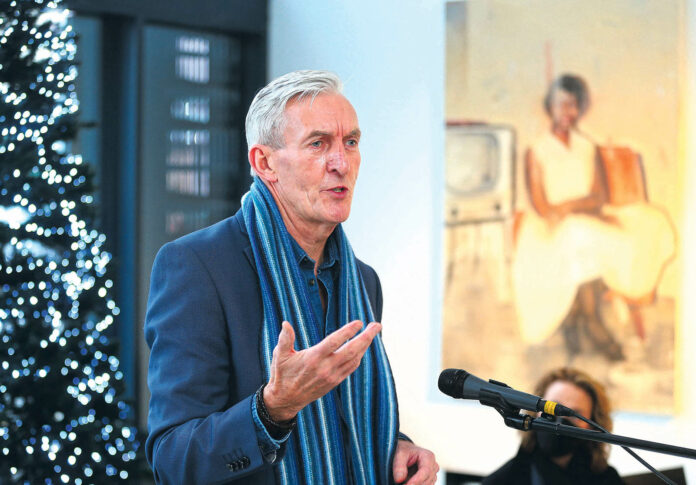FORMER hunger striker Laurence McKeown will hold the Clare launch of his new book at the West County Hotel at 7.30pm on Thursday, June 30.
The book, Time Shadows: A Prison Memoir details McKeown’s time in the Maze Prison from his arrival in 1976 to the aftermath of the 1981 hunger strike in which Bobby Sands and nine other republican prisoners died.
In all the author spent 1,621 days on the blanket protest, in which IRA prisoners refused to wear uniforms, 1,079 days on the no wash protest and finally 70 days on hunger strike.
His life was spared when his family intervened to authorise medical attention when he was in a coma on the point of death.
He has gone on to be a successful poet, playwright and author, and co-wrote the 2001 film about the Hunger Strike, H3, directed by Les Blair. In 1998 he was awarded a Doctorate in Sociology by Queens University Belfast, having completed a Bachelors degree while in prison.
Having joined the IRA as a teenager, he was arrested in the summer of 1976 and the following April sentenced to life imprisonment for causing explosions and the attempted murder of an RUC officer.
Decades later he is quite unapologetic about his role in the conflict and says he doesn’t have regrets.
“I think it’s tragic that’s the way it went and looking back in terms of the nationalist community I don’t think we had the option of doing things differently. So no I don’t.
“The wider thing is tragic, that so many people lost their lives and went to jail. But personally I believe I did what I should have done at the time and it influenced the course of my life.”
He had grown up in quite a mixed area, but says the behaviour of the UDR, a locally recruited and almost exclusively Protestant regiment of the British Army, was the catalyst for him joining the Provos.
“I was seeing things on TV, also some people who were older than me in school ended up in prison, but largely it was the behaviour of the Ulster Defence Regiment.
“They were set up to replace the B Specials who were responsible for killings and all the rest of it. They were disbanded and the UDR set up, it became the largest regiment in the British Army, it was over 90% from the unionist community.
“People who I had played football with were now stopping me, asking my name, where I was coming from and going to. Initially they were embarrassed because they knew me well, but after that the embarrassment went and there was hostility.”
“It highlighted to me that there were two communities, but it’s not about what church you go to on a Sunday. One of them has uniforms and weapons and they can do to my community what they want. It was a big turning point for me, I was about 16 and about 17 I joined the IRA.”
The removal of political status from paramilitaries had created fury in their ranks, and the 1981 Hunger Strike was an escalation of previous protests.
“The Hunger Strike can only be understood in the context of the five years that preceded it. You were locked up 24/7 naked, the cell walls covered in excrement. The Hunger Strike was meant to end that type of protest.
“I wouldn’t say fear, but there’s a very clear awareness of what you’re involved in. There was a realisation that it was either hunger strike or total capitulation, and that wasn’t going to happen.”
Six foot two in height, he was only ten and a half stone when he began his hunger strike, having endured very difficult conditions for the previous few years.
Recalling his early days without food, he says, “The only thing you took was water and salt, you need salt for the brain function. I felt really, really cold, we didn’t have any clothes, just blankets to wear.
“Usually after about three weeks, in my case a bit longer, you’d be removed to the hospital. We thought at the start it was to isolate us, but they said that having everyone together made it easier to monitor the situation, which is correct.”
After about six weeks he said his eyesight started to deteriorate, but his sense of smell was really heightened.
As the days went on he tried to get up and move around every day, as much for the psychological benefit as anything, but eventually that became impossible.
“Even when you’re very weak You keep getting up every day to do something, but it gets to the point when you can’t do that, and you know at that stage you’re on the way out. Six prisoners had already died before I was brought to the hospital.”
Famously Bobby Sands died after 66 days without food and McKeown slipped into a coma after 70, at which point his family took the decision to have him fed.
“They were allowed in after 68 days when I was still lucid. I don’t remember the 69th day but apparently I was responding to voices and getting confused who I was speaking to. Then on the morning of the 70th day the doctor pronounced me deep in a coma.
“A number of families had already intervened when their relative lost consciousness. Power of attorney at that point shifts to the next of kin and they can decide to allow medical intervention, which is really to feed you.
“I regained consciousness in the Royal Victoria Hospital in Belfast and the following day I was taken to the Musgrave Security Hospital, where the others were who were taken off the Hunger Strike.”
What goes through the mind of a man who was willing to sacrifice his life, had assumed he was going to die but wakes up to find himself very much alive?
“When I woke up in the intensive care unit I realised I had survived and what must have happened. I was neither happy to be alive or sad to be alive.
“I was so exhausted, physically, mentally, emotionally and psychologically.
“I think everyone who died on the Hunger Strike wanted to live, they fought up until the last minute.
“There was a real emptiness. What was going to happen to me the next day or next week, I didn’t care. I just existed and that was more or less it. I thought I would just die the way other people had went, given the length of time I’d been on it.”
His eyesight has been permanently affected, while he says it took years to recover from the 70 days without food.
He was in prison until 1992 and started to take on different roles there.
“The Hunger Strike ended a few weeks later, nobody else died. I was in jail for the next 11 years, took a very vocal role in the developments after that, I ended up on the IRA’s camp staff for a couple of years, was very involved in our education programme, then later on in poetry workshops, setting up a magazine, writing books, that kind of thing.”
The book launch will be chaired by Sinn Féin Councillor Donna McGettigan who said the hunger strikers are an inspiration to her.
“For me to chair this book launch is a real honour. The hunger strike was a watershed in modern history.
“The political growth of Sinn Féin is in no small measure a result of their courage. Their legacy is also to be found in the peace protest.
“The book launch starts at 7.30pm and everyone is welcome. It will be a fascinating insight into a historic time.”
Owen Ryan has been a journalist with the Clare Champion since 2007, having previously worked with a number of other publications in Limerick, Cork and Galway. His first book will be published in December 2024.



